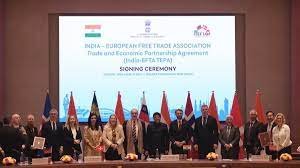India and the European Free Trade Association (EFTA) nations comprising Iceland, Liechtenstein, Norway, and Switzerland have achieved a significant milestone by signing a comprehensive free trade agreement. This agreement, hailed as a “watershed moment” by Prime Minister Narendra Modi, is poised to reshape economic dynamics and foster closer collaboration between the participating nations.
Under the agreement, the EFTA nations have extended duty-free access to a wide array of Indian products, including animal products, fish, processed food, and vegetable oils. Moreover, they have committed to investing a staggering $100 billion in India over the next 15 years, which is anticipated to generate approximately one million jobs, providing a substantial boost to the country’s economy.
#WATCH | During the India-EFTA Trade and Economic Partnership Agreement Signing Ceremony, Union Minister Piyush Goyal says, “It is a momentous occasion. The signing of the Trade and Economic Partnership Agreement with the European Free Trade Association marks the culmination of… pic.twitter.com/ixySy1n7K7
— ANI (@ANI) March 10, 2024
The negotiations leading to this historic pact have been ongoing for over a decade, highlighting the dedication and perseverance of both sides in fostering stronger economic ties.
 The signing of the agreement underscores a shared commitment to open and equitable trade, emphasizing the potential for mutual prosperity and growth.
The signing of the agreement underscores a shared commitment to open and equitable trade, emphasizing the potential for mutual prosperity and growth.
This landmark agreement is expected to yield significant benefits across various sectors, including pharmaceuticals, medical devices, processed food, and industrial goods. By facilitating better-integrated supply chains and simplifying customs procedures, it aims to enhance market access and promote investment opportunities for businesses on both sides.
India’s importance in EU
While the deal holds immense promise for bolstering trade and investment between India and the EFTA nations, some experts caution against expecting substantial gains, particularly in the agricultural sector. India’s exports to EFTA countries remain relatively low, and challenges such as strict quality standards and non-tariff barriers may limit significant growth in agricultural exports.
Despite these challenges, the agreement marks a crucial step forward in strengthening bilateral relations and fostering economic cooperation between India and the EFTA nations. It reflects a shared commitment to dialogue, cooperation, and mutual understanding, laying the foundation for enhanced trade and investment exchanges in the years to come.
The signing of the free trade agreement represents not only a significant economic achievement but also a testament to the diplomatic efforts and collaborative spirit of all parties involved. As India and the EFTA nations embark on this new chapter of economic partnership, they are poised to unlock a world of opportunities and realize shared aspirations for prosperity and development.












